Recording and translation ©A. P. David 2022.
Greek text hyperlinked to lexica via Perseus (perseus.tufts.edu):
ἀλλὰ καὶ ὣς μύθοισιν ἀμειβόμενος προσέειπον:
‘ταῦτα μὲν οὕτω δὴ τελέω, γέρον, ὡς σὺ κελεύεις.
ἀλλ᾽ ἄγε μοι τόδε εἰπὲ καὶ ἀτρεκέως κατάλεξον,
ἢ πάντες σὺν νηυσὶν ἀπήμονες ἦλθον Ἀχαιοί,
οὓς Νέστωρ καὶ ἐγὼ λίπομεν Τροίηθεν ἰόντες,
ἦέ τις ὤλετ᾽ ὀλέθρῳ ἀδευκέι ἧς ἐπὶ νηὸς
ἠὲ φίλων ἐν χερσίν, ἐπεὶ πόλεμον τολύπευσεν.’
ὣς ἐφάμην, ὁ δέ μ᾽ αὐτίκ᾽ ἀμειβόμενος προσέειπεν:
Ἀτρεΐδη, τί με ταῦτα διείρεαι; οὐδέ τί σε χρὴ
ἴδμεναι, οὐδὲ δαῆναι ἐμὸν νόον: οὐδέ σέ φημι
δὴν ἄκλαυτον ἔσεσθαι, ἐπὴν ἐὺ πάντα πύθηαι.
πολλοὶ μὲν γὰρ τῶν γε δάμεν, πολλοὶ δὲ λίποντο:
ἀρχοὶ δ᾽ αὖ δύο μοῦνοι Ἀχαιῶν χαλκοχιτώνων
ἐν νόστῳ ἀπόλοντο: μάχῃ δέ τε καὶ σὺ παρῆσθα.
εἷς δ᾽ ἔτι που ζωὸς κατερύκεται εὐρέι πόντῳ.
Αἴας μὲν μετὰ νηυσὶ δάμη δολιχηρέτμοισι.
Γυρῇσίν μιν πρῶτα Ποσειδάων ἐπέλασσεν
πέτρῃσιν μεγάλῃσι καὶ ἐξεσάωσε θαλάσσης:
καί νύ κεν ἔκφυγε κῆρα καὶ ἐχθόμενός περ Ἀθήνῃ,
εἰ μὴ ὑπερφίαλον ἔπος ἔκβαλε καὶ μέγ᾽ ἀάσθη:
φῆ ῥ᾽ ἀέκητι θεῶν φυγέειν μέγα λαῖτμα θαλάσσης.
τοῦ δὲ Ποσειδάων μεγάλ᾽ ἔκλυεν αὐδήσαντος:
αὐτίκ᾽ ἔπειτα τρίαιναν ἑλὼν χερσὶ στιβαρῇσιν
ἤλασε Γυραίην πέτρην, ἀπὸ δ᾽ ἔσχισεν αὐτήν:
καὶ τὸ μὲν αὐτόθι μεῖνε, τὸ δὲ τρύφος ἔμπεσε πόντῳ,
τῷ ῥ᾽ Αἴας τὸ πρῶτον ἐφεζόμενος μέγ᾽ ἀάσθη:
τὸν δ᾽ ἐφόρει κατὰ πόντον ἀπείρονα κυμαίνοντα.
ὣς ὁ μὲν ἔνθ᾽ ἀπόλωλεν, ἐπεὶ πίεν ἁλμυρὸν ὕδωρ.’
Samuel Butler’s translation with certain names Hellenised:
“ … nevertheless, I answered, ‘I will do
all, old man, that you have laid upon me; but now tell me, and tell
me true, whether all the Achaeans whom Nestor and I left behind us
when we set sail from Troy have got home safely, or whether any one
of them came to a bad end either on board his own ship or among his
friends when the days of his fighting were done.’
“‘Son of Atreus,’ he answered, ‘why ask me? You had better not know
what I can tell you, for your eyes will surely fill when you have
heard my story. Many of those about whom you ask are dead and gone,
but many still remain, and only two of the chief men among the Achaeans
perished during their return home. As for what happened on the field
of battle—you were there yourself. A third Achaean leader is still
at sea, alive, but hindered from returning. Ajax was wrecked, for
Poseidon drove him on to the great rocks of Gyrae; nevertheless, he
let him get safe out of the water, and in spite of all Athena’s hatred
he would have escaped death, if he had not ruined himself by boasting.
He said the gods could not drown him even though they had tried to
do so, and when Poseidon heard this large talk, he seized his trident
in his two brawny hands, and split the rock of Gyrae in two pieces.
The base remained where it was, but the part on which Ajax was sitting
fell headlong into the sea and carried Ajax with it; so he drank salt
water and was drowned …








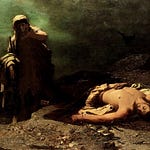
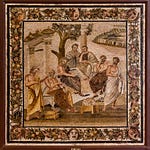


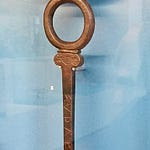
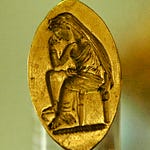
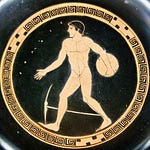
Homer's Odyssey δ 4.484-511